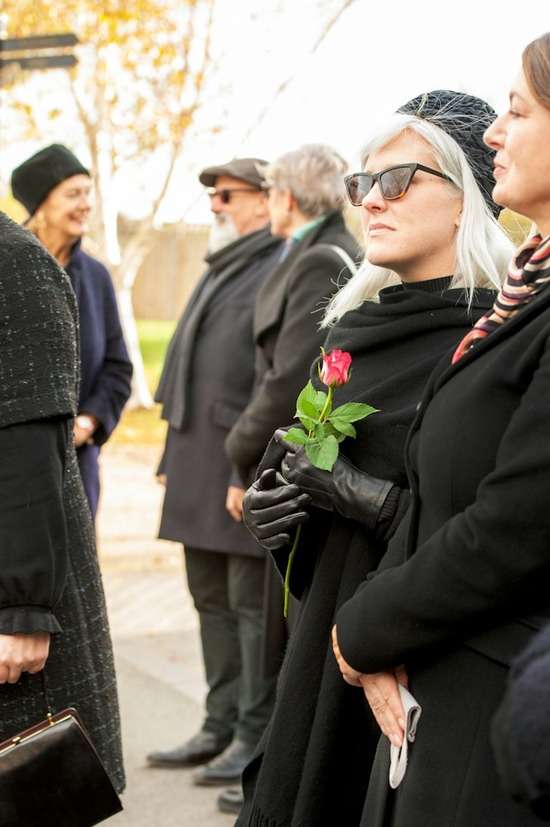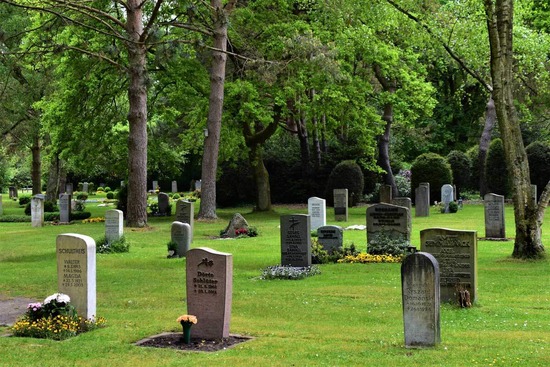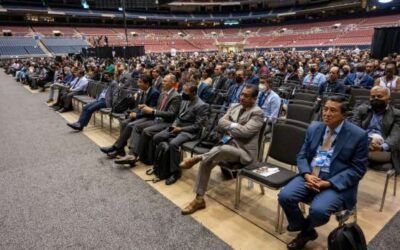Most Seventh-day Adventist funeral services are similar to those of other Protestant denominations, such as Methodists, Baptists, or Presbyterians, but you might find a few differences or unique nuances.
Adventists consider death a sad effect of sin. It is a time for mourning and recognizing the fragility of life, and it should be regarded with the appropriate amount of somber respect for those it affects.
It is always difficult to face death, whether thinking about our own or that of someone we care about.
Adventists also look forward in faith to the resurrection at the Second Coming of Christ, knowing that the resurrection and eternal life with Jesus is a blessing to look forward to. Though we recognize that death is a sad occasion, there is a measure of comfort and peace we can hold onto as believers, knowing we will be reunited at Jesus’ return.
Let’s look more closely at these beliefs, and how members of the Seventh-day Adventist Church put them into practice:
- What Adventists believe about death
- Common Adventist burial practices
- Common funeral practices
- How Adventists support the bereaved
Let’s start with looking at the scriptural basis for how we view death.
What Adventists believe about death

Photo by Sandy Millar on Unsplash
You can read the official Fundamental Belief page about this topic, but here’s a summary.
Seventh-day Adventists believe that when a person dies, their body decomposes (Genesis 3:19) as they no longer have the “breath of life” (Genesis 2:7) in them. And while this breath of life returns to God, it is as if that person is in a state of unconsciousness. Like sleep, they are unaware of anything.
“For the living know that they will die; but the dead know nothing, and they have no more reward, for the memory of them is forgotten” (Ecclesiastes 9:5, NKJV).
No part of a dead person is active or aware—not the body, not any soul or spirit. They don’t exist in a spirit world that can contact living relatives.
The dead won’t know anything until Jesus Christ returns at the Second Coming and resurrects them to eternal life.
Because we believe this, we don’t believe anyone goes straight to heaven or hell right after they die. So our customs surrounding death don’t talk about or refer to death as a propelling step into heaven or hell. We refer to those who have passed on as “resting” in the grave.
Because they are at rest, Adventist funerals often include a hopeful undertone, despite grief being a natural and healthy thing to accompany a loss (Ecclesiastes 3:4). But our faith reminds us that Christ conquered death and promised He would return to take us all to heaven, defeating death forever (1 Corinthians 15:19-26).
The next thing a dead person will see is Jesus returning.
In light of these beliefs, let’s look at some Adventist burial practices.
Common Adventist burial practices
Officially speaking, Adventists don’t hold to one specific type of burial practice. We follow what most Christians do and bury or cremate those who have just died.
Burying the dead was a Jewish tradition (1 Kings 2:10, 1 Kings 15:24, 2 Kings 20:21) which was passed down to Christianity. 1
Cremation is also common and can be practical for many reasons. While the Bible doesn’t directly discuss it, it does give us an example of when cremation was employed. In 1 Samuel, we read of King Saul and his sons’ deaths during battle.
Most Israelites by this point were quite fed up with Saul and eager for David to become king. But the people of Jabesh Gilead, who Saul had once saved, remembered him favorably (1 Samuel 11). Out of respect, they “took the body of Saul and the bodies of his sons from the wall of Beth Shan; and they came to Jabesh and burned them there. Then they took their bones and buried them under the tamarisk tree at Jabesh, and fasted seven days” (1 Samuel 31:12-13, NKJV).
These bodies were likely mutilated and unpleasant to behold, and burning them was a sign of respect.
As far as our beliefs are concerned, the burial process is mostly due to practical and sentimental reasons. While there may be symbolic meaning within the burial practices, there is no lasting significance for the departed person and it will make no difference in how the events of the resurrection take place.
No matter how the deceased was put to rest, they will still be raised to life when Jesus returns. So Adventists leave the decision of burial or cremation up to the individuals and families.
This perspective is also behind the reasons many Adventist funerals are considered fairly simple and practical, rarely prioritizing costly or elaborate displays. Generally, we’d rather focus on supporting and comforting those who are grieving.
Common funeral practices in Adventist communities
Typically, when someone passes away, the immediate family gets to work preparing a funeral. Depending on circumstances, a funeral service could be held anywhere between a few days or a few weeks from the time of death.
It’s common for Adventists to avoid holding funerals on Sabbath, mostly because it involves a tremendous amount of work, planning, travel, and accommodations. On Sabbath, Adventists make it a priority to rest from everyday activities and focus on spending time with God.
Celebration of life services
Many Adventist communities also hold “celebration of life” or memorial services, whether in addition to a formal funeral or in place of it. These could be held up to a few months after the person’s death.
Generally, these services take the place of funerals if the body was cremated or the funeral has to be delayed past the reasonable timeframe for burial.
Or in the case of larger Adventist communities, a family might hold a small graveside service for close friends and family, and a later memorial service to include others in fondly remembering their loved one.
Viewings
The day before or day of a funeral, Adventists might hold a viewing, or a window of time (usually a few hours) when friends and family can come to the funeral home or church and speak with the relatives of the deceased. This may be an open-casket occasion, or the family may display pictures.
Funerals

Photo by The Good Funeral Guide on Unsplash
The funeral service typically takes place in a church or the funeral home. People attending might wear dark clothing and typically little or no jewelry, because of some of our beliefs about what we wear. The service often includes music, prayer, a reading of the obituary, Scripture readings, a few words from the pastor, and a benediction.
The pastor’s homily tends to focus on the hope we have in God and His plan, because all Adventists look for the day when Jesus returns at the Second Coming, and we’ll see our loved ones again in heaven. The whole service tends to have a hopeful feel, rather than one of abject sorrow, although the event is not without sadness.
The service doesn’t tend to be long—30 minutes or so, though it can depend on how many people share memories.
If the family chooses to have a graveside service, everyone will then drive to the gravesite, where the minister will often have a brief graveside service. Participants will sprinkle flowers over the casket, and it will be lowered into the ground.
In some cases, the family may provide a meal after the burial service for guests.
Even though this is a general blueprint for an Adventist funeral, there are countless variations you can expect to see. It depends on the family’s preferences and the individual’s requests, as long as it doesn’t conflict with the church’s official beliefs.
It also varies widely depending on the region of the world you live in. All cultures have their own traditions within Adventism, and it’s important to remember they may not look exactly like what we just described.
A funeral is an unhappy time, and Adventists seek to provide comfort for grieving loved ones. Let’s talk about that next.
How Adventists support the bereaved
Funerals are a difficult time for the loved ones, who bear the sadness and often the financial burden as well.
Sometimes, the deceased’s family prefers to grieve privately, and their wishes should be respected. But as much as possible, Adventists try to help their friends during this time of sadness. They may send flowers or gifts to the family’s home, to let them know they’re thinking about them and praying for them.
Other times, church members may send food to the family. A funeral involves a lot of planning, and sometimes the last thing the bereaved want to think about is deciding what they’re going to eat, or what they’ll serve for those visiting from out of town. It can be an extra burden to have to organize and prepare those meals, so the local church family tries to help as much as they can.
Visiting the grieving members can also be appreciated, if they’re up to it. Sometimes the grieving family members need someone to talk to for various reasons: getting their mind off their sadness, having a friend to talk to about preparations, or having someone to comfort them and reassure them in a time that is overwhelmed with sorrow and uncertainty.
The most important thing you can do when an Adventist you know loses a family member is do your best to understand what their individual needs might be, and try to help them in accordance with those needs. Find ways to sincerely let them know that you sympathize with them.
Death of a loved one is hard to cope with, even for Christians like Adventists who know we’ll see our Christian family members after the resurrection.
While we make sure not to dismiss this temporal sorrow we experience after a loss, we do recognize that it’s important to hold fast to that hope Jesus gives us, even in our darkest trials. He promised to never leave or forsake us (Hebrews 13:5).
And, even better, He promises that these horrible feelings people endure now will indeed end someday. When Jesus returns,
“. . .God will wipe away every tear from their eyes; there shall be no more death, nor sorrow, nor crying. There shall be no more pain, for the former things have passed away” (Revelation 21:4, NKJV).
Our sadness and pain won’t exist forever! We’ll see our loved ones someday, a day when death is banished forever. This is the hope Adventists cling to.
If you’d like to read more of what the Bible says about this time of mourning,
Related pages
- Reid, George W, “Cremation,” Adventist Biblical Research.org, General Conference of Seventh-day Adventists, https://www.adventistbiblicalresearch.org/materials/cremation/.[↵]
More Answers
Do Seventh-Day Adventists Have “Rules” For Clothing?
Many religions have guidelines on dress, but what about the Adventist Church? Discover how Adventists choose to dress based on biblical principles.
11 Reasons People Become Seventh-day Adventists
Curious why many people become Adventists? Here are elements of Adventist beliefs, values, and mission often reflected in people’s decisions to join.
What’s the Seventh-day Adventist General Conference Session?
At the General Conference Session, Adventist delegates from around the world gather to assess the state of the organization, pray, and discuss current issues. Here’s how it works.
How Adventists View the End of the World
The end of the world is no fun to think about. But here’s how we can actually find hope and comfort in what’s to come.
What Is an Adventist Medical Missionary?
A medical missionary in the Adventist Church is someone who cares for the medical needs of people as a way of showing the love of Jesus. They may travel to another country, or even just serve in their hometown.
Is the Seventh-day Adventist Church Protestant?
Learn how the beliefs of the Seventh-day Adventist Church align with the “5 solas” of Protestantism.
Are Seventh-day Adventists Evangelicals?
According to its origins and definition, evangelicalism is about following Jesus and the Bible and sharing the Gospel through the way we live our lives. Adventists wholeheartedly harmonize with these principles.
Could Anything Keep Me from Becoming an Adventist?
We are each saved through Christ. But when it comes to church membership, are there certain beliefs or expectations to become an Adventist?
Do Seventh-day Adventists Have “Rules”?
We uphold principles we believe will help us maintain a closer relationship with Jesus and His Word. Learn how these principles guide Adventist lifestyles.
Do Seventh-day Adventists Have “Rules” For Marriage?
Around the world, many cultures and religions have various marriage traditions, expectations, or even rules when it comes to choosing a partner, planning the wedding, extended family logistics, or a number of other things.
Can a Seventh-day Adventist Marry a Non-Adventist?
Yes. Seventh-day Adventists are not under any official rules that dictate who they can or cannot marry. This is a personal, life-altering decision between the couple and God.
What Adventists Believe About Alcohol and Tobacco Use
The Seventh-day Adventist Church has historically discouraged the use of alcohol and tobacco. Even before the church started in 1863, its leaders were realizing the negative effects of these substances.
Jewelry—Why Do Many Seventh-day Adventists Choose Not to Wear It?
If you walk into a Seventh-day Adventist church service, you might notice that many people aren’t wearing earrings, bracelets, necklaces, or sometimes even wedding rings.
International Pathfinder Camporee
Youth aged 10-15 in the Adventist Church’s global Pathfinder program look forward to the International Camporee every 5 years. This event brings together Pathfinders from around the world for exciting activities.
How Adventists interpret Bible prophecy
Bible prophecy conjures up a variety of emotions in people. For some, it feels exciting or mysterious.
Moviegoers’ Guide to The Hopeful: The Facts Behind the Film
Learn where and when you can watch The Hopeful and how to get tickets. Already seen it? We’ll uncover the real story that inspired this film.
How Are Seventh-day Adventists Different from Other Protestants?
As a Protestant Christian denomination, the Seventh-day Adventist Church regards the Bible as the ultimate guide and looks to Jesus Christ as the only way to salvation. We do have some differences of belief or interpretation when it comes to topics like Bible prophecy, end-time events, the Sabbath, and a person’s state after death.
Adventist Culture
Many Seventh-day Adventists adhere to specific lifestyle principles that can make them stand out from those in other Christian denominations. Whether it’s going to church services on Saturday or eating the popular Adventist entrée of “haystacks.”
Do Adventists Observe Easter-Related Holidays?
Jesus Christ’s resurrection, celebrated on many Easter-related holidays, is central to the beliefs of the Seventh-day Adventist Church. And that means we seek every opportunity to remember it.
An Overview of Seventh-day Adventist Higher Education
The Seventh-day Adventist Church has about 118 tertiary schools around the world. Though many of them are within North America, you’ll also find Adventist universities in countries across the world—places like Croatia, Austria, Brazil, Madagascar, and the Philippines.
The Ten Commandments from a Seventh-day Adventist Perspective
Ever eaten a salad and gotten a big piece of green stuck in your teeth? And you didn’t realize it was there until you looked in the mirror? (Because no one ever told you!)
The Benefits of A Seventh-day Adventist Academy
Adventist academies are high schools (grades 9-12) that are owned and operated by the Seventh-day Adventist Church.
Are Seventh-day Adventists Christians?
Yes, the Seventh-day Adventist Church is a Protestant Christian denomination formed in 1863. Just like other Christians, we believe that Jesus Christ is our Savior and seek to follow the principles of the Word of God.
Adventist Movies: Where Faith and Film Meet
The Adventist Church uses film to share our faith and uplift positive values. Learn more about specific Adventist-produced films and where to find them.
Do Adventists Celebrate Christmas?
In general, most Seventh-day Adventists do celebrate Christmas.
Since our denomination doesn’t have specific guidelines about holidays, it’s up to each member to decide whether to celebrate it based on their personal convictions and study of the Bible.
What Does the Bible Say About Modesty
Seventh-day Adventists and Christians in general try to ensure their outward presentation and lifestyle glorify God. This often involves daily habits like the ways we hold conversations, the ways we dress and accessorize, and the ways we regard other people when we’re out and about.
How Do Adventists Make Movie and Music Choices?
How do Adventists decide what music to listen to and which movies to watch? Learn how Bible principles can help us make better entertainment choices.
Does the Seventh-day Adventist Church Believe in Paying Tithe?
Seventh-day Adventists believe in paying tithe and offerings based on the biblical command and our commitment to being wise stewards of God’s resources. These donations help fund the mission of the Adventist Church by supporting pastors, missionaries, church expenses, and evangelistic projects, among other things.
Seventh-day Adventist World Population and Demographics
The Adventist Church has more than 22 million members and 100,000 churches worldwide, plus a large system of hospitals, schools, and publishing houses. Learn more about this diverse church.
Didn’t find your answer? Ask us!
We understand your concern of having questions but not knowing who to ask—we’ve felt it ourselves. When you’re ready to learn more about Adventists, send us a question! We know a thing or two about Adventists.
































